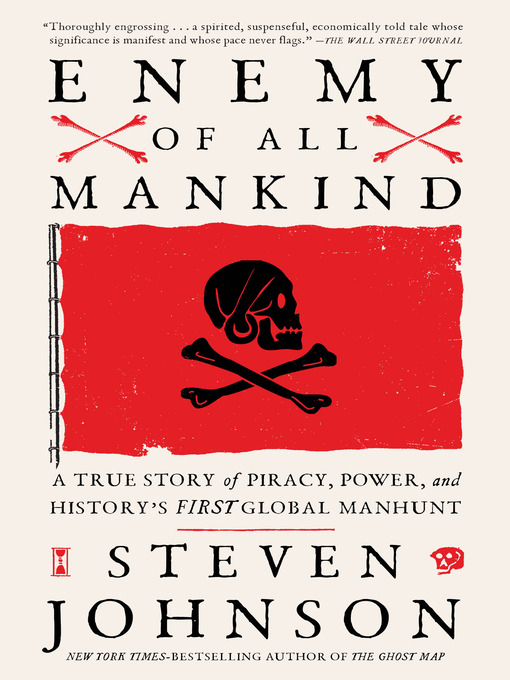
Enemy of All Mankind
A True Story of Piracy, Power, and History's First Global Manhunt
کتاب های مرتبط
- اطلاعات
- نقد و بررسی
- دیدگاه کاربران
نقد و بررسی

Starred review from January 6, 2020
Johnson (Farsighted), a historian and popular science writer, recounts the story of English pirate Henry Every’s 1695 seizure of a Grand Mughal treasure ship returning to India from Mecca and its global ramifications in this entertaining and erudite chronicle. Johnson charts the historical arcs, including the rise of the Mughal Empire, the East India Company’s efforts to tap into the Empire’s wealth, and the “radical egalitarianism” that came to characterize early modern piracy that set Every and the Mughal ship on a collision course, and details how the Englishman’s actions were quickly mythologized at home, with rumors circulating that he won the heart of a Muslim princess along with an estimated £200,000 (equivalent to about $20 million today) worth of gold and jewels. At the Mughal court, however, the incident was reported as a horrific “gang rape.” Facing pressure, the East India Company organized a worldwide manhunt for Every (who was never caught) and thereby gained sovereignty over the Indian Ocean, which permanently altered the balance of power in the region, reshaped Anglo-Indian relations, and helped to launch a new global era, according to Johnson, whose lucid prose and sophisticated analysis brings these events to vibrant life. This thoroughly enjoyable history reveals how a single act can reverberate across centuries.

March 1, 2020
In September 1695, English pirate and mutineer Henry Every, commanding three ships and 200 sailors, stormed an Indian treasure ship in the Arabian Sea, gaining fabulous wealth. The pirates also committed rape, torture, and murder against Muslim passengers and crew on the Ganj-i-Sawai. Victims included women of the imperial court of Aurangzeb, and pilgrims voyaging home from the holy city of Mecca. Johnson (The Ghost Map) weaves a tapestry of treasure, tribunals, emperors, atrocities, and a pirate's life at sea. One of the most notorious acts of piracy in history, Every's attack imperiled English relations with the Mogul Empire, obligating the British East India Company to provide armed escorts for Indian trading fleets. Policing the seas proved another step toward British maritime hegemony and imperial rule over India. The British Crown put a huge price on Every's head, and though five of his crew were arrested and hanged, Every vanished into legend. English juries refused to convict the buccaneers for crimes against foreign Muslims; instead, Avery's men were hanged for mutiny. Like other pirates in an emerging age of print media sensationalism, Every quickly became a folk hero of books and ballads. VERDICT Consummate popular history: fast-paced, intelligent, and entertaining. [See Prepub Alert, 11/4/19.]--Michael Rodriguez, Univ. of Connecticut, Storrs
Copyright 2020 Library Journal, LLC Used with permission.

March 1, 2020
The logo of modern capitalism isn't properly the dollar sign but instead the skull and crossbones. Wide-ranging as always, Johnson, author of such bestsellers as Everything Bad Is Good for You and How We Got to Now, locates the origins of our current dog-eat-dog economic condition in the actions of a flotilla of 17th-century pirates. Led by a mutineer named Henry Every, six ships converged at the mouth of the Red Sea, just where modern pirates gather today, to raid the fleets of the declining Mughal Empire. They attacked one huge ship that had the misfortune of having a cannon misfire even as a lucky shot from the pirate fleet took down the main mast. Aboard was a fortune in diamonds--and a harem that the pirates, as might be expected, treated as their own. The attack set in motion a number of things. For one, the British East India Company, sensing weakness, moved to secure a foothold in India while thwarting Parliament's regulatory efforts to weaken the power of that early corporation. For its part, the British government declared Every and company to be enemies of mankind to be killed upon sight. Every disappeared, but some of his shipmates were not so fortunate. Johnson writes with vigor and evident fascination for Every and his exploits--that foundational mutiny, for instance, "one of those rare moments from history where we can re-create an almost second-by-second account of the actions." His equation of their "radical dream of economic and political liberation" with the behavior of modern moguldom is arguable, but the predatory, sociopathic nature of the pirates is surely not. This makes it ever stranger that Every, now almost unknown, should have been a rock star in his day, and especially in a media-innocent time when brigands such as Walter Ralegh and Edward Teach commanded much public notice. As with all of Johnson's work, a highly readable, deeply researched look into a little-explored corner of history.
COPYRIGHT(2020) Kirkus Reviews, ALL RIGHTS RESERVED.

























دیدگاه کاربران